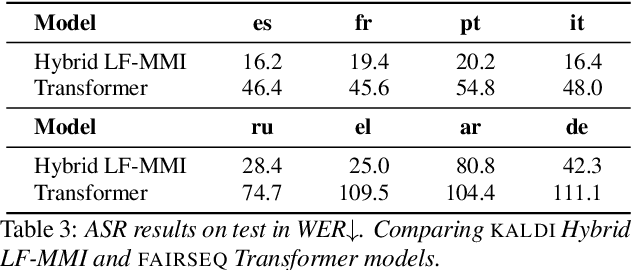Jacob Bremerman
Machine Translation Robustness to Natural Asemantic Variation
May 25, 2022



Abstract:We introduce and formalize an under-studied linguistic phenomenon we call Natural Asemantic Variation (NAV) and investigate it in the context of Machine Translation (MT) robustness. Standard MT models are shown to be less robust to rarer, nuanced language forms, and current robustness techniques do not account for this kind of perturbation despite their prevalence in "real world" data. Experiment results provide more insight into the nature of NAV and we demonstrate strategies to improve performance on NAV. We also show that NAV robustness can be transferred across languages and fine that synthetic perturbations can achieve some but not all of the benefits of human-generated NAV data.
The Multilingual TEDx Corpus for Speech Recognition and Translation
Feb 02, 2021



Abstract:We present the Multilingual TEDx corpus, built to support speech recognition (ASR) and speech translation (ST) research across many non-English source languages. The corpus is a collection of audio recordings from TEDx talks in 8 source languages. We segment transcripts into sentences and align them to the source-language audio and target-language translations. The corpus is released along with open-sourced code enabling extension to new talks and languages as they become available. Our corpus creation methodology can be applied to more languages than previous work, and creates multi-way parallel evaluation sets. We provide baselines in multiple ASR and ST settings, including multilingual models to improve translation performance for low-resource language pairs.
 Add to Chrome
Add to Chrome Add to Firefox
Add to Firefox Add to Edge
Add to Edge